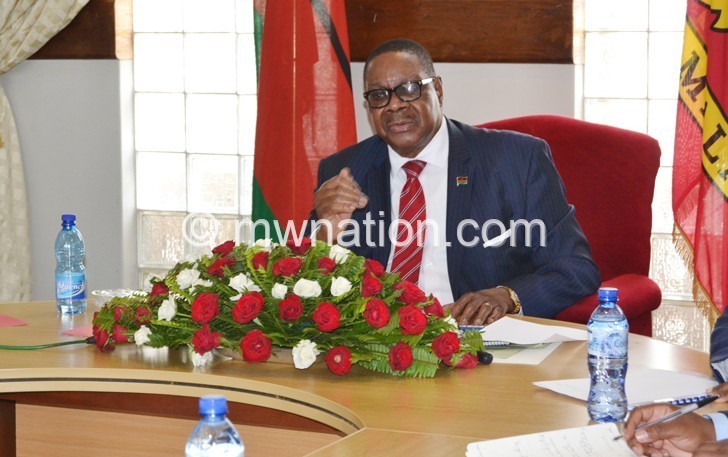APM weakens MHRC
- Fails to correct appointment mistake for six months
- Govt seeks AG’s legal opinion
President Peter Mutharika’s failure to rectify anomalies in appointing MHRC members has hamstrung the body as it cannot make crucial human rights decisions without commissioners.
Malawi Human Rights Commission (MHRC) executive secretary David Nungu said last week lack of commissioners is preventing the institution from making crucial decisions and general or specific directions to the secretariat.

Said Nungu: “The commission is in the appointed members as well as ex-officio members. The secretariat serves to support those commissioners.”
Since March this year, the commission has been operating with two ex-officio members—the Law Commissioner and the Ombudsman who do not have voting powers.
According to the 2016 amendment of Section 26 of the Act, decisions of the commission are made by the majority of the appointed commissioners voting at a meeting.
The lack of appointed commissioners has reduced the constitutionally-established human rights watchdog to doing only day-to-day work that does not demand the decision-making of the commission, according to Nungu.
Nungu explained: “Decision-making requiring the full commission cannot be made. Moreover, meetings of the Commission or a committee of the commission cannot be convened without the chairperson of the commission.
“A typical example of an issue requiring decision-making by the full membership of the commission is the [requirement] for MHRC to make a verdict on the conduct of the disputed May 21 2019 elections,”
A legal expert and former chairperson of MHRC Justin Dzonzi said in the absence of the appointed commissioners, the two ex-officio commissioners cannot make crucial or policy decisions of the commission for lack of capacity.
“What makes it complicated is that their voting powers were removed and within the framework of corporate governance they are ex-officials, which means they cannot vote on any decision,” he observed.
“Therefore, this means, without the full membership of the commission, these meetings of the commission where decisions are to be made cannot be convened,” said Dzonzi.
Section 4 (1) of the Act and Section 131 of the country’s Constitution provide that the Law Commissioner and the Ombudsman shall jointly recommend and submit names of the persons to the President for formal appointment as MHRC commissioners.
When the two officers recommended and submitted names of these persons for President Mutharika to formally appoint them as commissioners, he substituted two of them with his own names.
Mutharika appointed law lecturer Sunduzwayo Madise, Ombudsman Martha Chizuma, journalist Baldwin Chiyamwaka, Reverend Cecilia Kotima, Stella Twea, Scader Louis and Boniface Massah as commissioners.
Chiyamwaka and Kotima were not on the list that the Law Commissioner and Ombudsman submitted to the President.
Centre for Development of People (Cedep) and Centre for Human Rights and Rehabilitation (CHRR)—challenged the appointments in court for allegedly flouting appointment regulations.
The protests forced government to postpone swearing-in of the commissioners.
Cedep executive director Gift Trapence also told our sister newspaper The Nation in April this year that what they wanted was for Mutharika to simply correct the anomaly he committed. In an interview on Wednesday, Trapence said they were fighting for respect of the procedures and laws on how commissioners ought to be appointed.
He said should Mutharika rectify the anomaly, they were ready to withdraw the court injunction for the appointment process to be finalised.
Eight months down the line, Mutharika is yet to correct the alleged irregularity and his spokesperson Mgeme Kalirani said, in an interview Thursday, the matter was stalled because of the court process and the order obtained by the CSOs.
“Those issues have not been addressed; that’s why there is no movement on the issue,” said Kalirani.
Government spokesperson and Minister of Information Mark Bottomani also said the process of appointing the commissioners was being delayed by the court order the CSOs obtained, which also restrained the swearing-in of the appointed members.
“But government has sought legal advice from the Attorney General. Once this is provided, government would expedite the swearing-in of members of the commission,” Bottomani said.
In another interview on Thursday, the Ombudsman said the Law Commissioner and herself were also working “tirelessly toward sorting out the standstill and ensuring we have a full commission.”
But, in an interview last week, Attorney General Kalekeni Kaphale also referred Weekend Nation to Solicitor General Gertrude Hiwa, saying “she could have latest information on the topic”.
But Hiwa did not pick up her phone yesterday when contacted.
Two weeks ago, the State-funded MHRC also complained of lack of resources to undertake critical assignments amid piling workload to investigate human rights abuses in the country.
Responding to The Nation inquiry on whether the institution had embarked on probing circumstances surrounding the protests on October 8 2019 that claimed the life of a police officer in Msundwe in Lilongwe, Nungu expressed regret, saying his organisation was operating on a K1.2 billion budget against an ideal budget of K1.5 billion.
Nungu said the issue of inadequate resources did not have a bearing on the Access to Information Act (ATI) which became law in 2018, but which needs massive resources to roll it out. But he said ATI tasks need more resources for being a new law requiring mass sensitisation.
“Presently, the commission operates on a limited fleet of old vehicles mainly supplied by UNDP more than 10 years ago. Otherwise, we trust that the commencement date of ATI would be appointed soon by the Honourable Minister of Information,” he said.





